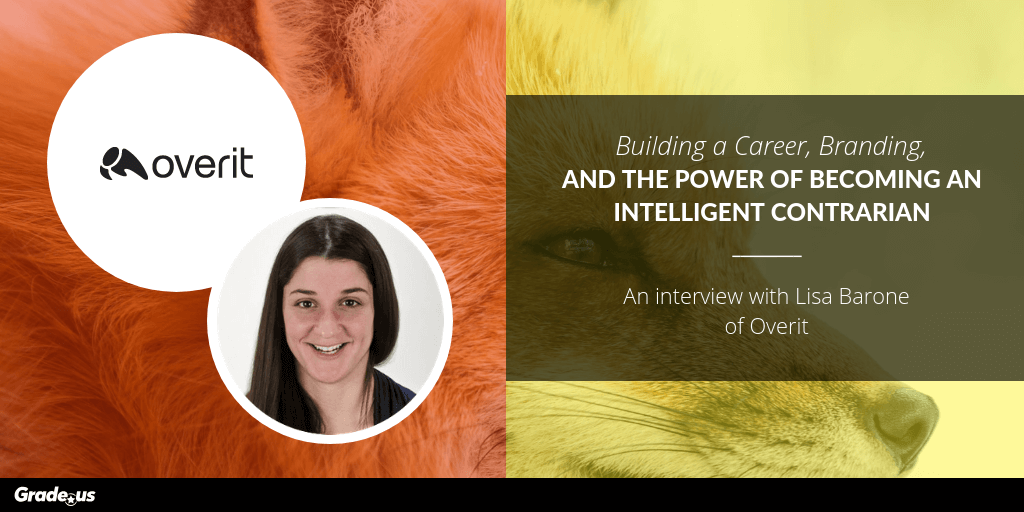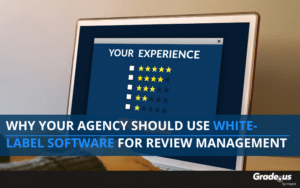Lisa Barone is the CMO at Overit, a marketing agency which has served clients like Acxiom, Beechnut Homestyle Baby Food, and even Marvel Comics.
She's personally been featured in publications like Inc Magazine., Business Week, Forbes, NY Times, PBS, Fox News, Entrepreneur, Reuters, Intuit, Mashable, and Techcrunch.
She's known for "saving brands, usually from themselves."
So I was thrilled to get a chance to sit down with her to talk about her approach and her thoughts, both on building such an awesome career and on helping businesses succeed.
On the biggest impact in shaping her career
Carmen: You've had quite the journey over the past 10+ years in the SEM/SEO, and Marketing industry. What would you say has been the most formative step in your career?
Lisa: That's a big question to start off with! I think I had some early mentors like when I was just starting out that kind of encouraged me to really focus on my craft, and to focus on figuring out what I was really good at. Then doing that and not listening to a lot of the noise or the feedback.
When I was first coming up, I think things like Twitter, like blogging, were really popular. There were a lot of opinions, and there was a lot of peanut gallery-type stuff. I think it was easy to say the "right thing" to appease the masses.
Early on, I had a lot of good mentors who taught me to how to be an intelligent contrarian.
So, not being afraid to take a stand, but to do so intelligently. I think that helped me to establish myself and to create a voice in the industry, where there were already a lot of voices.
On being an intelligent contrarian
Carmen: I like that term, intelligent contrarian, can you give me an example about one of the things you got intelligently contrary about?
Lisa: Sure. So, years ago, Seth Godin, he's this marketing genius. And he's basically known for being "that guy," right? A couple years ago, Seth had come out with this new idea he was trying to sell to the small business community. They had to pay to own their name. It was the early days of online reputation management. It was a hot idea.
I looked at it as a business owner and was like,
"Hey, making me pay you to own my brand name is brandjacking."
So I put a term to it, and was able to make an argument that was based in a business problem (versus attacking Seth as a person or crafting a snarky response.) Being able to take the high road on this situation and to be respectful about your difference of opinion and to lay it out makes it a lot easier for people to take in.
That post, and that article, gained a lot of attention, and it ended up being cited by all the industry publications, places like Business Week. At the end of the day, Seth changed the policy. He went back on this program. I'm sure he spent a lot of time creating it and thinking about it. For me, it was a really good example that little voices can be heard if you're able to communicate intelligently.
I think I've gained a reputation for being that person, who is able to take the opposite opinion, even if that means taking some heat for it, or getting a lot of negative comments, but I think it's important.
Carmen: Because you don't have those insights if you're not going to look and be willing to examine things that everybody else would just echo chamber.
Lisa: I think that critical thinking, being able to see the whole picture, is sometimes lost. People either want to stay in people's good graces, or they just blindly retweet and share things.
On the starting point of working with a small business
Carmen: When you start working with a small business, what's the most important part of the relationship to find success?
Is there anything you need to establish in the early communication that's been successful with all the business owners you've worked with?
Lisa: I think where we usually start is solidifying the brand. A lot of times, clients will come to us asking for a specific service. Or they'll come to us with an idea of what they want us to do. I think it's important to take that first step, to really understand who they are first.
One of the first things that we do with my clients is to have a brand workshop to identify who they are, their brand tenants, what they believe, what they stand for, what's different about how they do business, who their audiences are, how those audiences are different, and then creating a positioning statement and key messaging for their audiences.
That gives a really good foundation to build a marketing campaign on top of. Because now we know not only the tactics, but kind of the tools we're using, what we're saying, and who we're going after, and how we're going after them.
I think it's something that's unique about Overit. We view ourselves as a partner to our clients. In order to create that relationship and that trust, you need to be able to show the clients that you get them, and you're part of their team.
Carmen: Now when you're creating these brand stories, do you ever have to factor that relationship into that workshop or into that process?
Whether it's negative, positive, or even an accidental reputation for doing something a certain way. Or if they've gained a positive reputation they're not leveraging. Is that something you're taking into account?
Lisa: Yeah. I think considering where their reputation is today, how they're perceived versus what they want to be perceived as, and identifying what that gap is.
I think that's what the strategy is based on.
How are we going to move that needle?
On investing in small business SEO, content, and starting with small wins
Carmen: From an SEO standpoint, what are your thoughts on the evolution of the E-A-T strategy when it comes to content creation, and is it something you're working into your strategy for your clients?
Lisa: It absolutely is. I work really closely with our SEO team to make sure we are meeting their needs, but also meeting the consumer's needs. It's something we're thinking about, but at the same time I don't know that it's that new of an idea, right?
I think we were always trying to be the best answer. You were always trying to establish yourself, and answer the question the users or the buyers were asking. We've always been thinking about it. We've always been striving for it.
Carmen: Now, for smaller businesses, there is a longer play than the length of the contract you have with them. How do you approach a content creation strategy with them?
Content is a long game, it can take some businesses a long time to get anywhere with it. Small businesses, a lot of the time, are a little bit reluctant to stay in the game for as long as they need to stay in the game.
How do you work with that on that, and help them understand what needs to be done and get them to stick with you while they do it?
Lisa: I think it's all about small wins.
It's about picking that first goal and working toward it, and letting them see what that win tastes like, and the success it can have for their business.
I think they're a lot more likely to stick with it. We pride ourselves very strongly on reporting. Really helping the client to see the results of what we're doing. I think if you can pick one keyword, one phrase, one customer type, and then create a really targeted strategy to win that one thing, once you do, it builds a lot of trust for smaller businesses and smaller budgets.
I think it's a little bit like teaching a man to fish. We'll help you, we'll create the initial hub pages, or we'll create that initial foundation, and then help you keep building it.
Again, it's that partnership. We're all in this together.
On the importance of online reviews to small businesses
Carmen: Sure, that makes sense to me.
Now while I was looking through your marketing services on Overit I did see a brief mention of online reviews under social media management and reputation.
Do you believe it's becoming more important for small businesses, the reputation management? And if you were to offer review management, where would you place it in your overall suite of services?
Lisa: It is important for a small business. I think aside from the SEO and search benefits, it also just helps to build the expertise and that authority, so that people are more willing to trust you.
I think sometimes the small business, you might need a little more convincing just to know they're reputable.
That if you have a problem, they're going to be around to service it. Things like that.
Just in terms of our services, it kind of fits in a lot of different places. It depends on the overall marketing strategy for the client. It might fall into public relations. It might fall into SEO. It might fall into social media.
We really look at what the client problem is, and we solve it. It doesn't matter too much to us what we're actually billing it as.
Carmen: Are there common themes in those client problems, or do you find they're all over the place?
Lisa: I would say they're all over the place. It's equally a service-based business that doesn't have reviews and needs to create that footprint. It's equally the client with a couple of really bad reviews. We've had clients where their competitors are just launching actual smear campaigns, and we have to create some cover in the search results.
It's kind of all over the place. It really depends on the larger scope of the problem.
On starting an agency with a partner and specializing versus generalized offerings
Carmen: Switching gears a little bit, for other marketers looking to start their own agency, what advice would you offer to those just starting out? Is there anything you wish you'd known in your journey as a founder?
Lisa: If you're going to any kind of partnership situation, have really clear roles to identify who is responsible for what and how the day-to-day is going to work. Have an exit strategy. I think it's like having a prenup before you get married.
You need to understand what that parachute is going to look like. Even when everything's going really well, at some point you might want to change gears. Having that mapped out from the beginning will make it a lot easier (should it happen.)
I think that's kind of the same as any business. Really understand what you're good at. Stay small. Specializing, versus trying to do everything, will have you a tighter niche and therefore a more defined audience, which can make things a little bit easier when you're trying to start out and to build your brand.
On the pros and cons of developing a public influencer persona as an expert
Carmen: You've written a lot of content. You've become pretty well known in marketing circles thanks to your intelligent contrarian approach.
What are the pros and cons of having such a well-known and successful public persona?
Lisa: Oh, man.
The pros are that the network is there when you need it. Whether that means you need an introduction to somebody or you have a problem that you need solved or that you have something new in your product you want people to test.
Having access to a network of people who are smarter than you in what they do is incredibly powerful. The more people you know, the smarter you are.
That's a huge positive.
I think the con is that you really need a thick skin. People can be harsh. I think the bigger you are the more opinions people have. Being able to stay the course and follow what you know is right, I think is important.
I kind of acquired that following when I was still pretty young. It was hard. It was hard to have people who had constant opinions, and people who feel empowered by a keyboard.
I think having some strong mentors as a young person, finding her voice, was really important for me.
Carmen: Were you ever tempted to quit when you were dealing with all these opinions, or did your mentors keep you strong?
Lisa: I think a little of both. As you get through it, you trust yourself more and so factor in the comments less.
I'll tell you, one of the reasons I joined Overit was because it is a place where I would be part of a larger team. I think for the early part of my career I think I was a figurehead a lot. I was out there writing a lot, talking a lot, being really visible. I think being part of a larger team allowed me to step back from that a little bit.
There were other people here who could do that. I could really get my hands dirty with the work and keep my head down. I think that really helped me a lot. Gave me back some sanity.
On new marketing trends and never changing marketing foundations
Carmen: Are there any new marketing trends that are emerging that you think will actually stick?
Lisa: I think the AI revolution will stick.
"How can we improve that customer experience?"
Any time you can use technology to create a more seamless experience, or to answer a question, I think it will make you a hero to your customers.
I think AI is a strong tool when used correctly to do that.
Carmen: Fair enough! So, what's the one piece of marketing advice you'd say "never changes?"
Lisa: Delight your customer.
At the end of the day, I think marketing is about getting somebody to do something. There are a lot of ways to do that. There are a lot of shiny tools and tactics, and things you can do.
But I think at the end of the day, creating a great customer experience is the heart of all of it.
About the Author
Raney C. Hudson
Raney C. Hudson is an independent content consultant with a 10+ year track record in the digital marketing industry.









